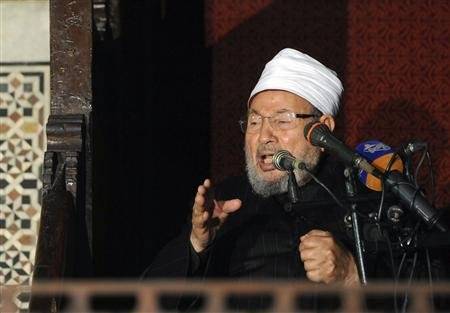Qatar-based Islamic cleric Yusuf al-Qaradawi issued on Monday a religious edict, or fatwa, in which he said that supporting ousted President Mohammad Mursi is an obligation.
 Qatar-based Islamic cleric Yusuf al-Qaradawi issued on Monday a religious edict, or fatwa, in which he said that supporting ousted President Mohammad Mursi is an obligation and called on Defense Minister Abdel Fattah al-Sisi to withdraw from the political scene to protect legitimacy and democracy.
Qatar-based Islamic cleric Yusuf al-Qaradawi issued on Monday a religious edict, or fatwa, in which he said that supporting ousted President Mohammad Mursi is an obligation and called on Defense Minister Abdel Fattah al-Sisi to withdraw from the political scene to protect legitimacy and democracy.
In his fatwa, Qaradawi said, 'I call on Sisi and those with him and all parties and political powers in Egypt to stand united to defend the truth and reinstate President Mursi and to continuously advise him.'
Qaradawi added that those whom Sisi has helped do not represent all Egyptians but only a small part of them.
He also said that Al-Azhar Grand Sheikh Ahmed Al-Tayyeb was wrong to support rebellion against the legitimate President of the country, saying his stance is neither supported by the Quran nor Prophetic tradition.
Qaradawi further added that Coptic Pope Tawadros II was not authorized to speak in the name of Copts, nor was Mohammad ElBaradei delegated by Egyptians to speak at their behest.
"ElBaradei only has the support of a handful of people and the opposition have not said that he is their representative," he said.
Qaradawi underlined that the ouster of Mursi was wrong, both from a constitutional and jurisprudential perspective.
"A president who was undoubtedly elected through democratic means should serve his entire term of four years so long as he is capable of working."
He added that from a jurisprudential point of view, a president should be obeyed.
In a fatwa he issued earlier this month, Qaradawi had called on Egyptians to back Mursi, as the elected president. In this fresh fatwa, Qaradawi deems supporting Mursi a religious obligation.
On 30 June, millions of Egyptians flocked to the streets across Egypt to demand Mursi's ouster and early presidential elections.
On 3 July, Sisi announced the removal of Mursi and the appointment of Adly Mansour, the head of the Supreme Constitutional court, as interim president.